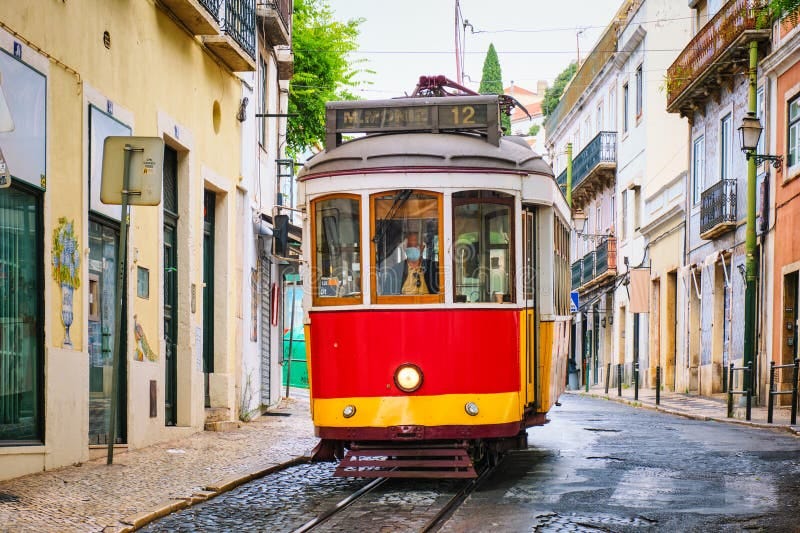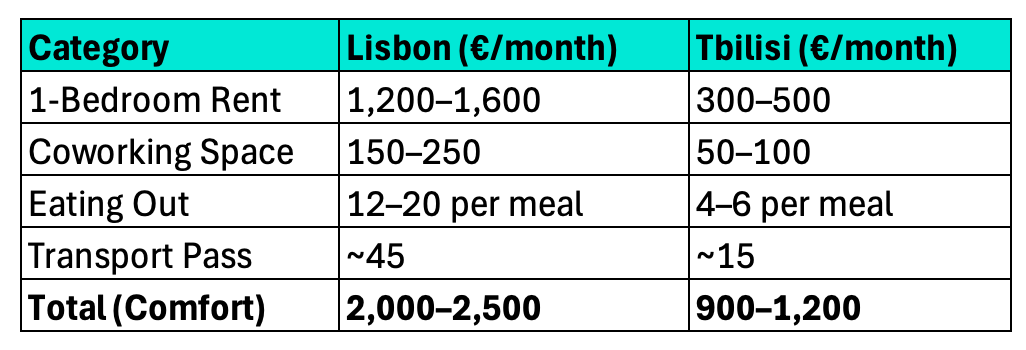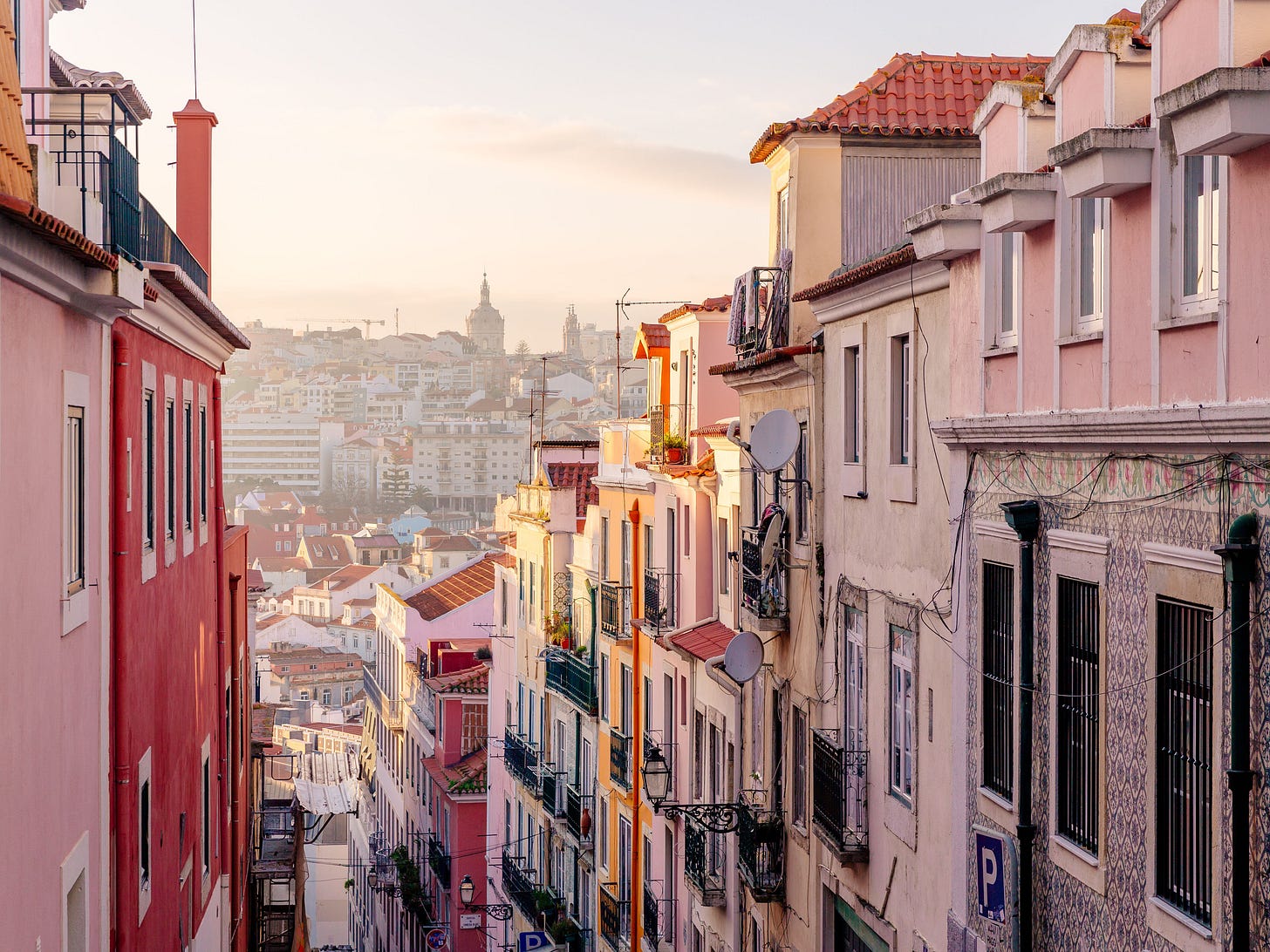Lisbon vs. Tbilisi: Which Is the Better European Base in 2025?
Comparing cost, culture, weather, and freedom for your next chapter.
Welcome to Digital Citizen 👋
After building businesses across multiple countries, one thing became clear. Success is not tied to one system, one location, or one way of thinking.
In today’s world, you can design life on your terms. Globally, intelligently, and with intention.
Digital Citizen is your guide to living smarter, working freely, and navigating a borderless world with clarity.
Subscribe to join a growing community of independent minds building a future without permission.
If I Moved To Europe
I often ask myself this question: If I had to pick one base in Europe or its periphery to build my life and business from, which would it be?
For many digital citizens, the choice often comes down to two options that are very different: Lisbon and Tbilisi.
One is a polished EU capital with ocean views, mild winters, and a mature expat scene. The other is a rising wildcard, but very affordable, and free.
In this post, I’ll break down the differences across cost, culture, weather, freedom, visas, and taxes, to help you figure out which one might fit your next chapter best.
Cost of Living
If you are optimising for value, this category alone might make the decision for you.
Tbilisi remains one of the most affordable cities in Europe’s orbit. With rent, meals, and essentials priced at a fraction of what you would pay in Western Europe, it's possible to live well on $900–$1,200/month without sacrificing quality of life. Long-term rentals can go for $300–$500 in central locations, and a good local meal rarely costs more than $5–6.
Lisbon, by contrast, has seen prices soar. Fueled by tourism, foreign demand, and limited housing supply, even modest apartments in central neighborhoods often exceed €1,200/month. Add in a rising cost of food, utilities, and co-working spaces, and you’re likely looking at €2,000–€2,500/month (at least) for a comfortable solo setup.
Affordability is not everything, but it can be a deal-breaker.
Let’s have a look at what it feels like to live in each place.
Culture & Vibe
Lisbon feels like it was made for Instagram.
The cobbled streets, tiled facades, pastel sunsets, and third-wave coffee shops create a calm, curated atmosphere. It’s a city that moves at a gentle pace but offers everything you need, from rooftop parties to remote work hubs, surf beaches to startup events. The international crowd is large and growing, especially among Europeans and North Americans chasing sun, safety, and stability.
Tbilisi, on the other hand, is raw.
It has an edge. The streets can feel chaotic, the buildings cracked, but the energy is alive. There is a strong creative scene, from electronic music clubs to underground art galleries. People are proud, resilient, and deeply hospitable. Unlike Lisbon, where the expat bubble can feel self-contained, Tbilisi pulls you into local life, for better or worse.
Weather & Environment
If weather shapes your mood, this category might carry more weight than you think. Personally, this would be one of my top categories.
Lisbon is pleasant. Sunny, dry, and rarely extreme. Winters feel more like spring in most parts of Europe, with temperatures hovering around 15°C and the occasional rainy spell. Summers are warm but moderated by the Atlantic breeze, making them surprisingly tolerable even at the peak. Whenever I visit Lisbon, I can run in shorts at the beach, without freezing, and also without collapsing from heat stroke.
You will wake up to sun most of the year. People eat outside in February. Locals surf before work. And even during the short rainy season, it never gets truly gray or oppressive.
Tbilisi, by contrast, offers real seasons. Summer feel intense, with dry heat climbing well over 35°C. Winters bring snow, wind, and temperatures that dip below freezing. Spring and autumn, though, are beautiful (especially autumn!). The city bursts with life as cafes spill into the streets and mountain trips become a weekend ritual.
There are also trade-offs. Tbilisi’s geography means air can get trapped in the valley, especially during winter, impacting air quality. And while the surrounding nature is spectacular, it is often not immediately accessible. Lisbon gives you ocean and coastline. Georgia gives you mountains and highlands.
So you should ask yourself:
Do you want gentle, year-round comfort or dramatic shifts that make you feel the seasons?
Freedom & Visas
For digital citizens, lifestyle is just half the equation.
The other half is freedom. How easy it is to stay, work, and move without friction.
Tbilisi is one of the most visa-friendly cities in the world. Citizens of over 90 countries (including the EU, UK, US, and Australia) can stay visa-free for a full 365 days. No applications, no paperwork, no need to explain what you’re doing there. And if you want to stay longer, you can either register a local company (which is fast and cheap) or simply do a border run and return.
Lisbon, by contrast, is part of the Schengen Area (and comes with all its limitations). Most non-EU citizens can stay for 90 days in any 180-day period, unless they secure a long-term visa. Portugal offers a Digital Nomad Visa, but it requires proof of remote income (€3,280/month as of 2025), private health insurance, and patience. Once granted, though, it’s a stable path to residency and even EU citizenship over time.
Read more about Portugals Digital Nomad Visa here (option 3).
There is also a broader sense of freedom that is harder to quantify. In Tbilisi, life feels less regulated. You can rent an apartment without contracts, start a business in a week, and walk the streets without anyone caring what you do.
In Lisbon, while everything works more smoothly on paper, you’re also dealing with bureaucracy, taxes, and EU compliance.
Long Story short:
If you want fast entry and low friction, take Georgia.
If you want a more permanent EU foothold, Portugal is a longer game.
Taxes & Business Setup
Georgia has become a tax haven for freelancers and solo founders, especially those earning foreign income. The standout feature is the Small Business Regime, which allows registered entrepreneurs to pay as little as 1% tax on revenue up to 500,000 GEL (about €160,000). Registering a business is fast, inexpensive, and doesn’t require local partners or residency. Bank accounts are easy to open, and crypto is largely unregulated.
Portugal is harder. It is part of the EU, so it comes with paperwork, waiting times, and a more complex tax system. Portugal used to offer the Non-Habitual Resident (NHR) regime, but that ended in 2024. The replacement, called the “Incentivised Tax Regime”, still offers some benefits (like a 20% flat income tax for specific professions), but foreign income is now largely taxed unless you can shield it through a structure abroad.
Setting up a Portuguese company is possible, but comes with higher costs, accounting obligations, and limited tax perks for solo operators.
If your income is mobile and remote, Georgia is far more founder-friendly.
What Else Might Tip the Scale?
Sometimes, the intangibles make or break a city. In any case, I suggest you visit each and judge for yourself.
Other factors to consider are:
Time Zone
Lisbon is on Western European Time, making it ideal if you are working with clients in the U.S. or Europe. Tbilisi, at UTC+4, puts you much closer to Asia, but might make late-night Zoom calls a regular part of your week if your network is West-facing.
Flight Access
Lisbon is well-connected to most of Europe and the Americas, with regular budget airline routes and major international hubs. Tbilisi’s options are more limited (Istanbul, Dubai, and Central Asia) but it's improving, and regional low-cost carriers are growing.
Which City Wins?
There is no universal answer, only the one that fits your goals, budget, and mindset right now.
Choose Lisbon if you are looking for a stable EU base, a polished lifestyle, and long-term integration. It’s clean, safe, and beautiful, with access to European networks, healthcare, and infrastructure. But you’ll pay for it, both in money and bureaucracy.
Choose Tbilisi if you want flexibility, low costs, and a sense of adventure. It is fast, cheap, and free. For remote workers, bootstrappers, or anyone building something new, Georgia gives you space and time to figure it out.
Send this to someone, who is thinking about making Europe their base!
If you liked this, you might also like …
Thanks for reading and see you soon! ❤️
If you’re enjoying Digital Citizen, tap ❤️ and 🔄 at the top to help more curious minds find their way here. It means a lot.









